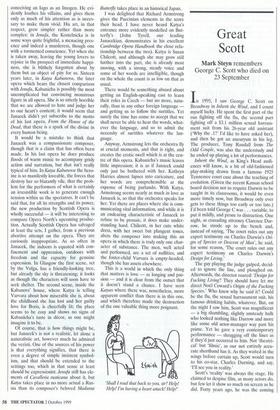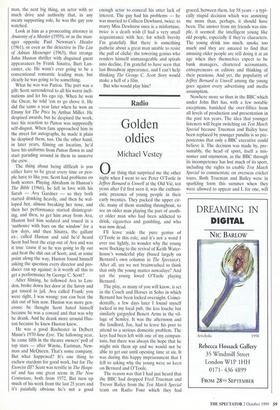Great Scott Mark Steyn remembers George C. Scott who died
on 23 September In 1995, I saw George C. Scott on Broadway in Inherit the Wind, and I count myself lucky. He spent the first part of the run fighting off the flu, the second part fighting off a $3.1 million sexual harrass- ment suit from his 26-year old assistant ('Why the .1?' I'd like to have asked her), and then he got an aneurysm in his leg. The producer, Tony Randall from The Odd Couple, was also the understudy and he ended up playing a lot of performances.
Inherit the Wind, as King's Head audi- ences will know, is a bit of old-fashioned play-making drawn from a famous 1925 Tennessee court case about the teaching of evolution. (Given the recent Kansas school board decision not to require Darwin to be taught in its classrooms, it would be even more timely now, but Broadway only ever gets to these things too early or too late.) I'd been told George C was ... variable, to put it mildly, and prone to distraction. One night, as crusading attorney Clarence Dar- row, he strode up to the bench and, instead of saying, 'The court rules out any expert testimony on Charles Darwin's Ori- gin of Species or Descent of Man', he said, for some reason, `The court rules out any expert testimony on Charles Darwin's Design for Living.'
The guy playing the judge gulped, decid- ed to ignore the line, and ploughed on. Afterwards, the director roared: 'Design for Fucking Living? They should have let me direct Noel Coward's Origin of the Fucking Species.' Who knew why he said it? Could be the flu, the sexual harrassment suit, his famous drinking habits, whatever. But, on the night I saw him, Scott was magnificent — a big shambling, slightly unsteady hulk who looked nothing like Darrow and more like some old actor-manager way past his prime. Yet he gave a very contemporary performance — shrugging off the lines as if they'd just occurred to him. Not 'theatri- cal' but 'filmic', as our not entirely accu- rate shorthand has it. As they waited in the wings before curtain up, Scott would turn to his co-star, Charles Durning, and say, 'I'll see you in reality.'
Scott's 'reality' was always the stage. He claimed to despise film, as many actors do, but few let it show so much on screen as he did. Forty years ago, he was the coming man, the next big thing, an actor with so much drive and authority that, in any meaty supporting role, he was the guy you watched.
Look at him as a prosecuting attorney in Anatomy of a Molder (1959), or as the man- ager opposite Paul Newman's Hustler (1961), or even as the detective in The List of Adrian Messenger (1963), that strange John Huston thriller with disguised guest appearances by Frank Sinatra, Burt Lan- caster, etc. He wasn't ever going to be a conventional romantic leading man, but clearly he was going to be something.
What he was was Patton. The part was a gift: Scott surrendered to all his worst incli- nations and let his ego rip. When he won the Oscar, he told 'em to go shove it. He did the same a year later when he won an Emmy for The Price by Arthur Miller. He despised awards, but he despised the work, too: his reaction to Patton was supposedly self-disgust. When fans approached him in the street for autographs, he made it plain he despised them, too. On the other hand, in later years, filming on location, he'd have his uniforms from Patton flown in and start parading around in them to unnerve the crew.
The thing about being difficult is you either have to be great every time or peo- ple have to like you. Scott had problems on both scores. Playing Abraham in Huston's The Bible (1966), he fell in love with his Sarah — Ava Gardner — so they both started drinking heavily, and then he wal- loped her, almost breaking her nose, and then her performance started disintegrat- ing, and then, to get him away from Ava, Huston had him sedated and tossed in a 'nuthouse with bars on the window' for a few days, and then Sinatra, the gallant ex-, called Huston and said he'd heard Scott had beat the crap out of Ava and was it true 'cause if so he was going to fly out and beat the shit out of Scott, and, at some point along the way, Huston found himself asking the question every director and pro- ducer ran up against: is it worth all this to get a performance by George C. Scott?
After filming, he followed Ava to Lon- don, broke down her door at the Savoy and got tossed in jail. Ava called Frank: you were right, I was wrong; you can beat the shit out of him now. Huston was more gen- erous: he thought Scott hated himself because he was a coward and that was why he drank. And he drank more around Hus- ton because he knew Huston knew.
He was a good Rochester in Delbert Mann's 1970 Jane Eyre. The following year, he came fifth in the theatre owners' poll of top stars — after Wayne, Eastman, New- man and McQueen. That's some company. But what happened? It's one thing to eschew stardom for good work, but for The Exorcist III? Scott was terrific in The Hospi- tal and has one great scene in The New Centurians, both from 1972. But turn up much of his work from the last 25 years and it's painfully obvious he's not a good enough actor to conceal his utter lack of interest. The guy had his problems — he was married to Colleen Dewhurst, twice: to marry Miss Dewhurst once is a misfortune, twice is a death wish (I had a very small acquaintance with her, for which brevity I'm grateful). But there is something pathetic about a great man unable to resist the pull of cliché: the towering genius who renders himself unmanageable and spirals into decline. I'm grateful to have seen that last Broadway appearance, and I can't help thinking The George C. Scott Story would make a hell of a film.
But who would play him?











































































 Previous page
Previous page